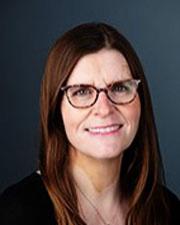Practicum Planning FAQ
Overview
Have questions about planning your social work practicum? Read through our list of frequently asked practicum planning questions on this page.
Email practicum@ku.edu for more information.
FAQ: Practicum Planning Overview
A practicum is a social work internship where students practice social work skills at a social service agency. Social work practicums involve working directly with individuals, families, and communities. Across all accredited social work programs, practicum is a course in the plan of study.
Any current, incoming, or prospective student can benefit from a practicum consultation. Consultation meetings can be in person, via phone, or virtual. Contact practicum@ku.edu or an Associate Director of Practicum.
Laurie Hart, Senior AD, LMSW (laurie.hart@ku.edu) leads MSW-clinical and MSW-macro practicum coordination and development for students who reside less than one hour from the KU Lawrence and Edwards campuses.
Vanessa Sanburn, LMSW (vsanburn@ku.edu) leads practicum development for MSW-Advanced Year students who reside more than one hour from the Lawrence or Edwards campus.
Gary Lasley, LMSW (glasley@ku.edu) leads BSW and MSW-Foundation practicum coordination and development who resides less than one hour from the KU Lawrence and Edwards campuses.
MJ Sellers, MSW (mikiesellersjr@ku.edu) leads BSW & MSW-Foundation Employment-Based Practicum (EBP) management and practicum development for MSW-Foundation students who reside more than one hour from the Lawrence or Edwards campus.
- Absolutely. Contact practicum@ku.edu.
- Consultation meetings can be in person, via phone, or virtual.
KUSSW partners with over 500 practicum sites across Kansas, Missouri, Oklahoma and across the country. Partners include hospitals, child welfare practicum sites, hospices, K-12 schools, police and sheriff departments, community mental health centers, small & large nonprofits, veterans’ medical campuses, public policy organizations, domestic violence shelters, and more.
- BSW and MSW foundation practicums are 16 hours per week for approximately 13 weeks a semester, for 416 hours.
- MSW clinical and macro concentration year practicums are 16 hours per week for approximately 16 weeks per semester, for 512 hours.
- BSW students are undergraduate students.
- MSW Foundation students have not completed a social work practicum and do not have a BSW degree.
- MSW Advanced Year students have completed a practicum year and are taking Clinical or Macro concentration coursework.
- BSW students complete ONE practicum, which lasts the academic year.
- MSW students in the traditional MSW program complete TWO practicums, each lasting an academic year.
- MSW students in the Advanced Standing program complete ONE practicum, which lasts an academic year.
- For BSW and MSW Foundation students, practicum begins the fourth week of August and concludes in early to mid-April. Students are not permitted to end their placement early.
- For MSW Advanced Year students, practicum begins the fourth week of August and concludes in late April. Students are not permitted to end their placement early.
FAQ: Practicum Selection, Interviewing and Placement
- Yes, but there is a brief application process.
- KUSSW refers to practicums with your social service employer as Employment Based Practicums (EBPs). EBP applications are most likely to be approved when the student can demonstrate:
- Their employer can provide a qualified Practicum Instructor (BSW or MSW degree + 2 years post BSW degree experience for a BSW student OR MSW + 2 years post MSW degree experience for an MSW student).
- The Practicum Instructor should not be your direct employment supervisor. (In rare cases, the Practicum Office makes exceptions.)
- The proposed practicum is level-appropriate and includes new learning. An Associate Director can assist you in determining whether the proposed practicum is level-appropriate.
- Their employer signs a statement of support.
No. KUSSW Practicum staff will collaborate with you to identify a practicum interview.
For practicum planning purposes, Distance Students reside more than an hour from a KU campus or attend a partner site, like K-State Salina. An Associate Director of Practicum works directly with distance students to find a practicum near their home. The planning process is highly individualized and often relies on a combination of the student’s community knowledge and the Associate Director’s social work education knowledge.
- MJ Sellers, MSW (mikiesellersjr@ku.edu) co-leads Employment-Based Practicum (EBP) management and practicum development for students who reside more than one hour from the Lawrence or Edwards campus. MJ works with BSW or MSW Foundation students.
- Vanessa Sanburn, (vsanburn@ku.edu) co-leads Employment-Based Practicum (EBP) management and practicum development for students who reside more than one hour from the Lawrence or Edwards campus, and/or attend a KUSSW partner site.
- KUSSW uses a practicum selecting software called Sonia Online.
- Students review possible practicum openings in Sonia and sort by their area of interest and/or location.
- Students rank four practicum sites that interest them so that practicum coordinators can understand your area(s) of interest.
- Practicum sites do NOT see your rankings or resume until the Practicum Office sends it to them.
- Students’ preferences are strongly considered, but a practicum at a ranked practicum is not guaranteed. (This is primarily because most practicum sites only host one or two practicum students.)
- If all of a student’s ranked practicums are full, a practicum coordinator will email a list of practicum options that are similar to the ones ranked. Students may select a practicum from the emailed list or meet with the practicum coordinator for a consultation.
- Students interview at one practicum site at a time.
- Students may decline a practicum and request a new practicum interview.
- Practicum staff recommends that students consult a practicum coordinator before declining a practicum.
- The vast majority of students confirm a practicum after one or two interviews.
No. Students interview at one site at a time. You must decline an interview; this is common practice among social work practicum education departments. It’s primarily related to competition for spots among KU students and neighboring schools.
Students are referred to practicum interviews starting in January. Nearly all practicums are confirmed by the end of June.
The practicum site and student agree that the practicum is a good match. In cases where the student or practicum site determines it’s not a good match, the practicum coordinator refers the student to another interview.
Yes and No. Students are precluded from arranging a practicum interview without first consulting with an Associate Director. Students who do not adhere to the “contact an Associate Director before outreaching the practicum site” rule risk their preferred practicum not being approved. However, students are encouraged to bring practicum planning ideas to an Associate Director, including new KUSSW practicum site partnership ideas.
Highly likely, no. Due to billing challenges, most private practices are not set up to support student practicums. There are a minimal number of practicums in a private practice setting.
No. Practicums are not guaranteed. They depend on location, practicum site interviews, employment markets, etc.
- Some practicums include psychotherapy, but it is not required or standard.
- Students may pursue a therapy license after their MSW degree. In all states, pursuing a clinical license includes 3,000+ hours of supervised individual therapy, typically over two or more years.
FAQ: Practicum Travel, Accommodations, Pay and Logistics
Every effort is made to establish a reasonable commute. Travel time to practicum depends significantly on where a student lives and where a suitable placement exists. Practicums more than an hour from a student’s home are not approved, except in rare cases with extenuating circumstances. For example, the student lives in a frontier region.
Accommodations for practicum related to medical or mental health disabilities, physical or sensory impairments, or attention/learning disorders often differ from classroom accommodations. For more information, contact the Student Access Center (SAC). Let them know that your education plan includes a practicum that may require early and specific accommodation planning.
Even if you are unsure if you will require accommodations, SAC is an excellent resource for helping you determine eligibility and potential accommodations for practicum. If you need accommodations in practicum and are working with SAC on those accommodations, please also contact practicum@ku.edu. Practicum Staff will assist.
Some practicum sites provide a stipend, wage, or scholarship, but more than not, practicum sites do not compensate student interns. The Practicum Office works to increase partnerships with sites that can compensate student interns.
Yes, but they are limited, and therefore we can’t guarantee them. Students seeking a practicum with flexible hours are encouraged to contact practicum@ku.edu early.
- No, students may not start practicum in the summer. However, exceptions are made for students who are expecting a baby or have mandatory pre-practicum training.
- Note: Students do not fall under the KUSSW practice insurance until classes start.
- Students with mandatory training before the practicum starts may complete training hours. These hours can be applied to a student’s overall practicum hour requirement but cannot be used to end practicum early and cannot include direct client work.
- Students (regardless of gender) expecting a baby may request an early practicum start due to Title IX protections. They may also end practicum early, depending on their circumstances.
- Most practicum sites require a background check. Depending on an individual practicum site’s policies and practices, a flag (infraction, charge, misdemeanor, or felony) on a background check may impact a student’s eligibility for that placement. Expunged and or dismissed charges often still appear on background checks. A flagged background check may delay the practicum placement process and, in some rare cases, may preclude placement. Students involved in the criminal justice system and with a history of an infraction, charge, misdemeanor, or felony are encouraged to schedule a practicum planning consultation with an Associate Director of Practicum Education; they can provide insight to students as to potential opportunities and barriers. Contact practicum@ku.edu for a practicum consultation with an Associate Director of Practicum.
- In some states, a person who has been involved in the criminal justice system and who has a history of an infraction, charge, misdemeanor, or felony may face barriers to social work licensure and may be precluded from working in certain settings or with specific populations of people.
- In most states, a person who has lost a professional license due to involvement in the criminal justice system or due to unethical conduct as determined by a professional or state board may face barriers to obtaining a practicum and or a social work license.
- Yes, but options are limited, and confirming your practicum may take longer.
- Students without a vehicle are encouraged to contact practicum@ku.edu early.
- A practicum that does not require a vehicle is not guaranteed.





